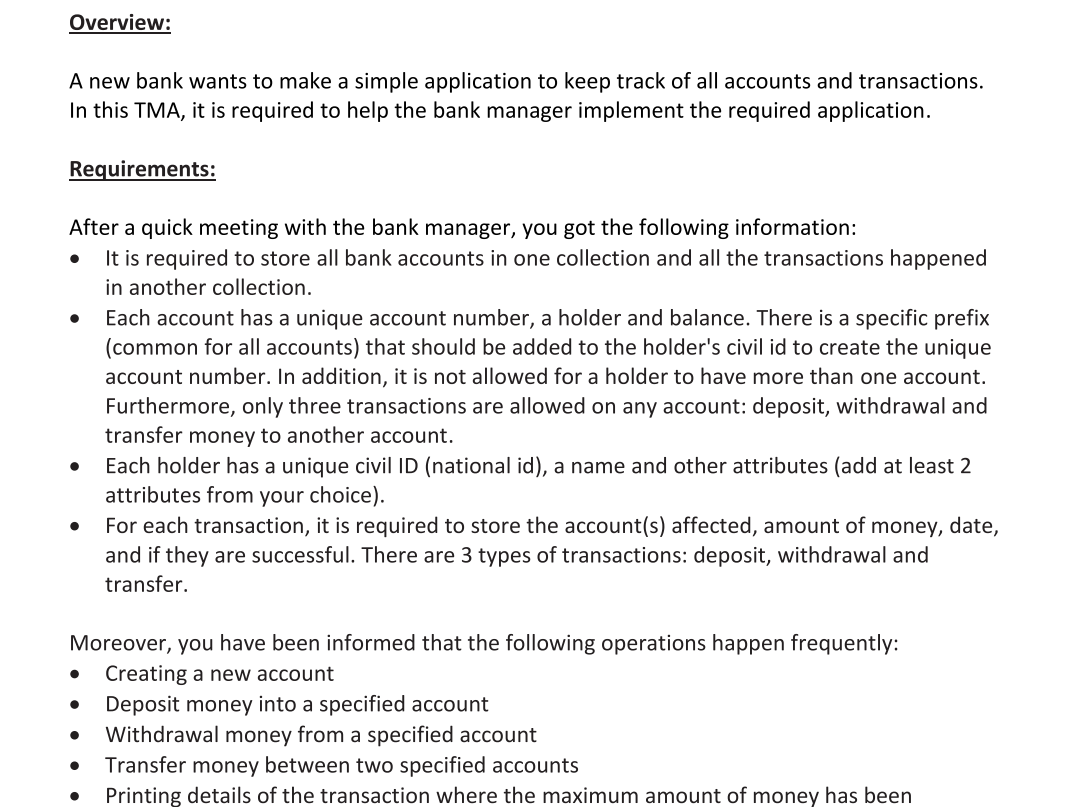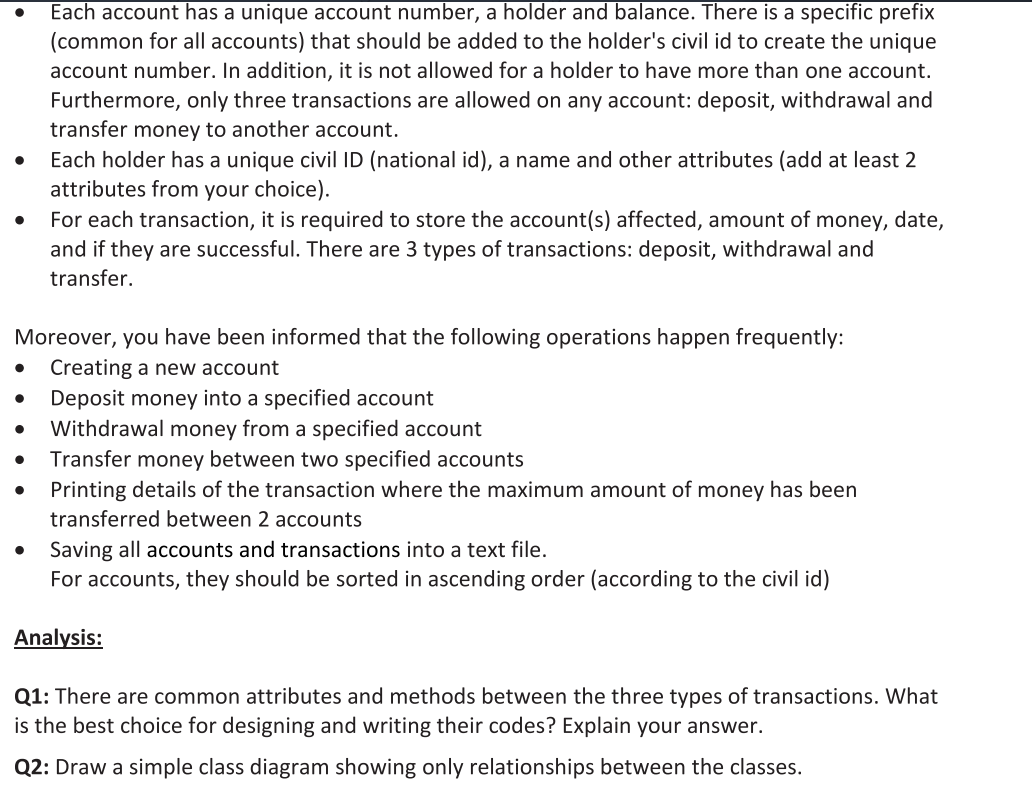A new bank wants to make a simple application to keep track of all accounts and transactions. In this TMA, it is required to help the bank manager implement the required application. Requirements: After a quick meeting with the bank manager, you got the following information: It is required to store all bank accounts in one collection and all the transactions happened in another collection. Each account has a unique account number, a holder and balance. There is a specific prefix (common for all accounts) that should be added to the holder's civil id to create the unique account number. In addition, it is not allowed for a holder to have more than one account. Furthermore, only three transactions are allowed on any account: deposit, withdrawal and transfer money to another account. Each holder has a unique civil ID (national id), a name and other attributes (add at least 2 attributes from your choice). For each transaction, it is required to store the account(s) affected, amount of money, date, and if they are successful. There are 3 types of transactions: deposit, withdrawal and transfer. Moreover, you have been informed that the following operations happen frequently: Creating a new account Deposit money into a specified account Withdrawal money from a specified account Transfer money between two specified accounts Printing details of the transaction where the maximum amount of money has been
A new bank wants to make a simple application to keep track of all accounts and transactions. In this TMA, it is required to help the bank manager implement the required application. Requirements: After a quick meeting with the bank manager, you got the following information: It is required to store all bank accounts in one collection and all the transactions happened in another collection. Each account has a unique account number, a holder and balance. There is a specific prefix (common for all accounts) that should be added to the holder's civil id to create the unique account number. In addition, it is not allowed for a holder to have more than one account. Furthermore, only three transactions are allowed on any account: deposit, withdrawal and transfer money to another account. Each holder has a unique civil ID (national id), a name and other attributes (add at least 2 attributes from your choice). For each transaction, it is required to store the account(s) affected, amount of money, date, and if they are successful. There are 3 types of transactions: deposit, withdrawal and transfer. Moreover, you have been informed that the following operations happen frequently: Creating a new account Deposit money into a specified account Withdrawal money from a specified account Transfer money between two specified accounts Printing details of the transaction where the maximum amount of money has been
Chapter8: Arrays
Section: Chapter Questions
Problem 6PE
Related questions
Question

Transcribed Image Text:Overview:
A new bank wants to make a simple application to keep track of all accounts and transactions.
In this TMA, it is required to help the bank manager implement the required application.
Requirements:
After a quick meeting with the bank manager, you got the following information:
It is required to store all bank accounts in one collection and all the transactions happened
in another collection.
Each account has a unique account number, a holder and balance. There is a specific prefix
(common for all accounts) that should be added to the holder's civil id to create the unique
account number. In addition, it is not allowed for a holder to have more than one account.
Furthermore, only three transactions are allowed on any account: deposit, withdrawal and
transfer money to another account.
Each holder has a unique civil ID (national id), a name and other attributes (add at least 2
attributes from your choice).
For each transaction, it is required to store the account(s) affected, amount of money, date,
and if they are successful. There are 3 types of transactions: deposit, withdrawal and
transfer.
Moreover, you have been informed that the following operations happen frequently:
Creating a new account
Deposit money into a specified account
Withdrawal money from a specified account
Transfer money between two specified accounts
Printing details of the transaction where the maximum amount of money has been

Transcribed Image Text:Each account has a unique account number, a holder and balance. There is a specific prefix
(common for all accounts) that should be added to the holder's civil id to create the unique
account number. In addition, it is not allowed for a holder to have more than one account.
Furthermore, only three transactions are allowed on any account: deposit, withdrawal and
transfer money to another account.
Each holder has a unique civil ID (national id), a name and other attributes (add at least 2
attributes from your choice).
For each transaction, it is required to store the account(s) affected, amount of money, date,
and if they are successful. There are 3 types of transactions: deposit, withdrawal and
transfer.
Moreover, you have been informed that the following operations happen frequently:
Creating a new account
Deposit money into a specified account
Withdrawal money from a specified account
Transfer money between two specified accounts
Printing details of the transaction where the maximum amount of money has been
transferred between 2 accounts
Saving all accounts and transactions into a text file.
For accounts, they should be sorted in ascending order (according to the civil id)
Analysis:
Q1: There are common attributes and methods between the three types of transactions. What
is the best choice for designing and writing their codes? Explain your answer.
Q2: Draw a simple class diagram showing only relationships between the classes.
Expert Solution
This question has been solved!
Explore an expertly crafted, step-by-step solution for a thorough understanding of key concepts.
This is a popular solution!
Trending now
This is a popular solution!
Step by step
Solved in 2 steps

Knowledge Booster
Learn more about
Need a deep-dive on the concept behind this application? Look no further. Learn more about this topic, computer-science and related others by exploring similar questions and additional content below.Recommended textbooks for you

EBK JAVA PROGRAMMING
Computer Science
ISBN:
9781337671385
Author:
FARRELL
Publisher:
CENGAGE LEARNING - CONSIGNMENT

Programming with Microsoft Visual Basic 2017
Computer Science
ISBN:
9781337102124
Author:
Diane Zak
Publisher:
Cengage Learning

EBK JAVA PROGRAMMING
Computer Science
ISBN:
9781305480537
Author:
FARRELL
Publisher:
CENGAGE LEARNING - CONSIGNMENT

EBK JAVA PROGRAMMING
Computer Science
ISBN:
9781337671385
Author:
FARRELL
Publisher:
CENGAGE LEARNING - CONSIGNMENT

Programming with Microsoft Visual Basic 2017
Computer Science
ISBN:
9781337102124
Author:
Diane Zak
Publisher:
Cengage Learning

EBK JAVA PROGRAMMING
Computer Science
ISBN:
9781305480537
Author:
FARRELL
Publisher:
CENGAGE LEARNING - CONSIGNMENT

Programming Logic & Design Comprehensive
Computer Science
ISBN:
9781337669405
Author:
FARRELL
Publisher:
Cengage